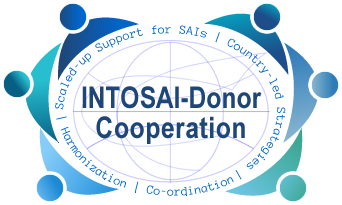INTOSAI Peer Reviews on Independence 2015-2017
The overall objective of the project was to enhance transparency and accountability of public finances in 7 selected countries with a focus on ADC partner countries.
Project purpose:
1. 7 SAIs show concrete commitment to take action to strengthen their independence.
2. Relevant international institutions take concrete action to deliver sustainable international programs to strengthen SAIs at national level.
Expected results:
– 7 peer review reports on compliance with International Standards of Supreme Audit Institutions, including recommendations for action at national level. One volunteering SAI from every INTOSAI region: • Albanian Supreme Audit Institution • Royal Audit Authority of Bhutan • Office of the Federal Auditor General of Ethiopia • Contraloría General del Estado de Ecuador • Auditor General’s Department of Trinidad and Tobago • Cour des Comptes de la Tunisie • The Auditor General’s Office of Vanuatu
– 1 comparative cross-cutting report including recommendations for further action at international level. – 1 report on lessons learnt in the context of the peer reviews.
– 1 adopted action plan based on the recommendations from the peer reviews.
Direct beneficiaries:
– 7 INTOSAI member SAIs with a focus on developing countries and ADC partner countries.
– The whole INTOSAI community, including the International Development Initiative (IDI).
Activities developed:
1.Conducting 7 peer reviews, including drafting and presenting 7 reports to respective SAIs.
2.Drafting and presenting 1 comparative cross-cutting report to INTOSAI, UN bodies and development partners.
3.Drafting and presenting 1 report about lessons learnt to relevant INTOSAI bodies.
4.Organizing 1 international conference for appr. 200 participants to develop and adopt an international action plan.
During an inception phase until end June 2015 the project partner specified activities, methodology, budget as well as the target group and partner SAIs and submit an inception report to ADC for approval. Furthermore seven SAIs supported the first stage of the project with personnel in kind contributions – by providing auditors to participate in the seven peer review teams: • Austrian Court of Audit (provided 20 auditors) • Department of the Auditor General of Bahamas (provided 1 auditor) • Federal Court of Accounts of Brazil (provided 1 auditor) • Accountability State Authority of Egypt (provided 1 auditor) • Office of the Auditor General of Ghana (provided 1 auditor) • Board of Audit of Japan (provided 1 auditor)
Background: SAIs play a vital role in holding governments accountable regarding the efficient use of public funds and serve as important pillars of good governance. Currently, over 40 % of INTOSAI member SAIs report cases of restricted independence, ranging from undue interference from the executive in the budget process to not being free to publish any reports at all.
Funding by Austrian Development Agency; personnel in kind contributions by: SAI Austria, SAI Bahamas, SAI Brazil, SAI Ghana, SAI Egypt, SAI Moldova
The project review was performed by NKU SR (SAI of Slovakia) and OAGN (SAI of Norway). Although there are no international standards for this type of review (evaluation), it was agreed the project review to be performed using the ISSAI framework, notably ISSAI 5600 and the OECD/DAC evaluation criteria, as far as applicable, and as stated in Guidelines for Project and Programme Evaluation 2009. The project review was performed as meta-evaluation (documents review of almost 400 pages). The evaluation also comprised of interviews with the peer reviewing teams´ members and representatives from the peer reviewed SAIs. The project peer review team concluded its work in mid-June 2017 after several months of intensive work and presented its report to the IGS and to ADA on 26 June 2017.
The project review team’s observations (and ensuing conclusions and recommendations) were manifold, but one observation in general was protruding out like a sore thumb – the most injuries were inflicted to the Mexico Declaration principle 8 (the financial and managerial/administrative autonomy and the availability of appropriate human, material and monetary resources), expecially in the monetary aspects. A legal or constitutional framework on financial autonomy was not in place for all SAIs reviewed within the project, they did not have full discretion over the budget allocation, the executive (in most cases via the Ministry of Finance) regulated or controlled the access to the SAIs resources, only one (out of seven) SAIs received its budget in the form of a lump sum, etc. That, of course, had impact on the SAIs maneouvrability and overall performance.
SAIs connected to this project
- Albania
- Bhutan
- Ecuador
- Ethiopia
- Trinidad and Tobago
- Tunisia
- Vanuatu
